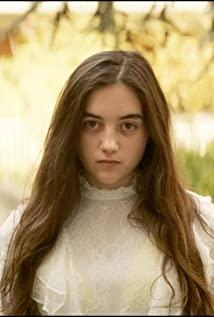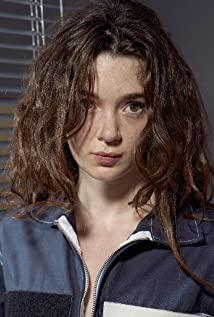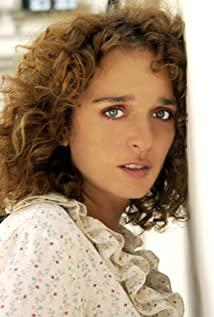I had seen Céline's "Tomboy" before, but I didn't have much of an impression. I probably knew Adèle because I knew that the two of them had been in a relationship. This film really made me know them all over again.
The story of the film is actually very simple, with few dialogues and soundtracks, but this seemingly boring story gives the director and actors a lot of room to play: most of the plot is driven by the two heroines "looking at each other" middle. They either peeked, looked directly, or observed, and in this way, the plot gradually heated up little by little. Audiences who are accustomed to well-made commercial blockbusters may find it difficult to watch this film, after all, there is very little dialogue and music, and even the colors are so cold, but I think that is the beauty of this film : There is no need for so many seasonings to taste, because the film itself is already full enough.
*The following contains spoilers*
I watched this film twice, and when I first went in to watch it, I didn't prepare anything, I only knew that Céline and Adèle were in a relationship (I didn't even know they had broken up at the time). But after watching it, I was completely overwhelmed: the few scenes with music are when the relationship between the two protagonists has changed significantly. Most of the time, the colors are dull, but there is a lot of ingenuity hidden inside: only Marianne's room and the beach are bright, and these are the places where they will not be disturbed by outsiders and only have each other's company. Héloise's blue and green dress is also cleverly arranged with Marianne's red dress. As Héloise said at the end, she changed, so the blue elements in the film gradually became green. It just so happened that after they parted, Marianne only wore blue clothes, which to some extent was her way of remembering Héloïse.
There are several scenes in the movie that I think are particularly worthy of aftertaste:
The servants are doing cross-stitching, Marianne is drinking and Héloise is cooking, which shows the harmony between women. They don't need men, but to some extent, it also alludes to a kind of women's only. Family Possibilities. Of course, I know that Céline doesn't assign them gender identities, but this scene feels like Marianne is the master of the family, Héloise is the master and the servant is like their child.
After they take their servants to the abortion, Héloise suddenly asks Marianne to paint a portrait that recreates the scene. That part was a bit uncomfortable for me to watch at first, but as the plot progressed I thought the arrangement made sense: Héloise didn't know this stuff before, so she didn't have the same kind of miscarriage as Marianne or the servants (or the audience present) There are worldly taboos, so she wants to show this scene again, because she is curious. This paragraph is to break the taboo of the secular attitude on the topic of abortion.
Marianne and Héloise had a fight when the portrait was finally finished, when Héloise asked her "do you want me to resist" (to the effect, can't remember in French, but it was obviously Héloise's wedding), Marianne said non , Héloise ran out angrily. The camera then cuts to the servant embroidering. If you have noticed the scene of Marianne, Héloise and the servant in the dining room, you will find that the original flower is in full bloom, but now the flower is withered, which also symbolizes the end of their relationship. But the best part is when Marianne finds Héloise and they come back to sleep at night (the mother is coming back the next morning, so it is their last night), when Héloise says "I remember" it is now Sometimes instead of Marianne's future, it shows that she has actually made a decision. I think this is the most worrying part. She had always wanted to fight, but it was always Marianne telling her not to fight, so she had made up her mind. What a desperate choice.
This passage is actually shown in the previous reading scene. When Héloise read that Orpheus finally turned his head, the servant asked why, Héloise rightfully said that because he was obsessed with love, the servant said it was wrong and he shouldn't have done it. Marianne stood between the two of them, explaining to the servant while expressing an ambiguous attitude towards the answer given by Héloise, as if she did not agree with Orpheus's approach. I thought this episode was handled so well that I didn't notice it the first time I watched it, and I almost cried the second time I watched it. In fact, servants and Héloise are two extremes, one is very worldly, the other is simple, and Marianne is right between them, she has the courage to break the world (she is free, she can inherit her father's business, and can paint in her father's name) , and there is no pressure of marriage, and their first intimate contact is also her first initiative), but she does not have the courage to abandon the world and go on completely, and Héloise has this courage. The last line of Héloise, perhaps Eurydice who made Orpheus come back ("Retourne-Toi"), also hints at the end of the film. Hey, I want to cry just typing this...
The three endings of the film have been analyzed countless times by many film critics and are unique classics.
The first ending - Retourne-Toi - Héloise walks down the stairs in a wedding dress (mother tricked her into saying it was a gift) to turn Marianne back, and Marianne does, but never looks back. Echoes the previous reading scene. This is also the only time in the film that no honorific is used between them. In the end, Héloise still wanted to save one last time, but Marianne still didn't take that step...
The second ending - Je l'ai revue la première fois - Marianne sees a portrait of Héloise and her child at an exhibition. Héloise held a book in his hand, hiding the secret between them. This episode also echoes the first time they "meet" Marianne to see a previously destroyed portrait.
The third ending - Je l'ai revue la dernière fois, elle m'a pas vue - Marianne sees Héloise for the last time in a symphony performance. Echoes the passage where Héloise asked her what a symphony was like before. They met and fell in love because of art (from borrowing books, to Marianne talking about music, to Marianne painting her portrait, to Marianne drawing their memories on books), and finally reuniting because of art. In fact, I think this ending is open. I think that music has played an important role in their relationship many times. In addition, both of them watched the show alone. I think they will have an intersection in the future. Céline still remains in the end gave us hope.
*Spoilers end*
In fact, the moment I walked into the theater, I didn't have much hope. In recent years, there have been very few same-sex film and television works that I am satisfied with (or I am not very satisfied with the films in Cannes in the past few years), and it is also a costume film, which makes it difficult to understand. But after watching it for the first time, I was completely convinced. It is such a film with no condiments. It covers the love, family and friendship between women in just two hours, and it also extends to men in this world. Sovereignty's repression of women and class differences among women (see Servant, Marianne, and Héloise). I feel that this movie is not only different from most movies, but also a new experience for Céline. Of course, it's not just the director's credit, the whole film is flawless from the lead, photography, music, styling (Noémie is so beautiful, I was drooling all the time when I watched it) to the supporting roles. The other films at Cannes this time, and even all the films I've seen, are not at the same level as this one.
If a person can only watch one movie in a lifetime, it would be enough to just watch "Portrait of a Lady on Fire".
View more about Portrait of a Lady on Fire reviews











